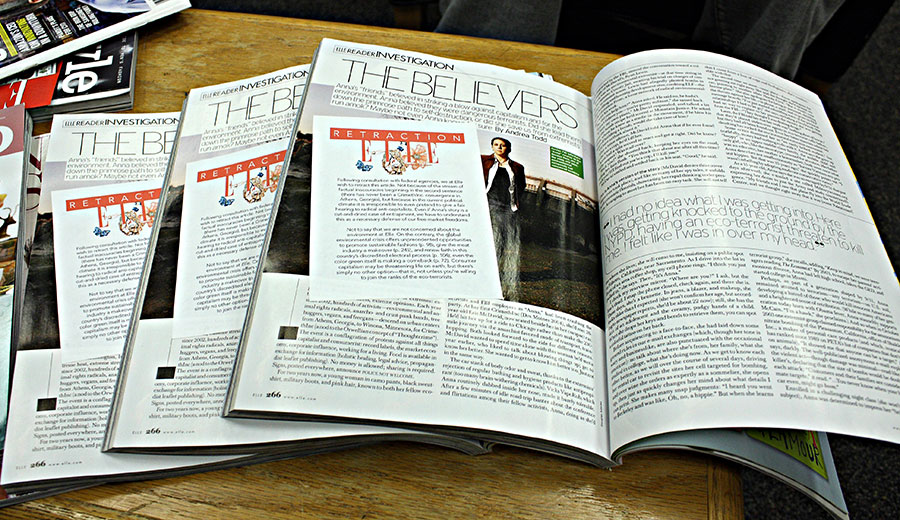The May issue of Elle has an article on how the FBI paid a young woman, known as “Anna,” to befriend activists and pressure them into illegal activity. Now, some of those she befriended and entrapped, including environmentalist Eric McDavid, are going to prison as terrorists.
“For two years now, a young woman in camo pants, black sweatshirt, military boots and pink hair, known to both her fellow eco-activists and FBI employers as ‘Anna,’ had been crashing the party.â€
Unfortunately Andrea Todd’s article misses the big picture—questioning the relentless push to label non-violent activists as “terrorists,†and the sleazy methods used to do that– for the sake of glamming up an interesting spy story.
She falls head-over-heels for the sexiness of the story—shadowy activists in love out to save the world—and swallows a series of absurdities provided by the FBI. Rather than pick apart every paragraph, I wanted to highlight a few good points buried within the sensationalism:
- Eric McDavid, Lauren Weiner and Zachary Jenson are accused of plotting to sabotage a U.S. Forest Service genetics tree lab and the Nimbus Dam. U.S. Attorney McGregor Scott has claimed that damage to the dam would have made “what happened in New Orleans after Hurricane Katrina look like a Sunday pancake breakfast.†Todd reports that Jeff McCracken, a spokesperson for the dam, says the water would just “trickle.†(p. 323)This is an important point when we’re talking about labeling people as “terrorists†who endangered human life. It’s a good example of how the government has consistently twisted the truth in the hopes of chalking up a victory in the “War on Terrorism.â€
- The FBI supplied Anna with a ’96 Chevy Lumina, and gas money, and food money, to drive Jenson and Weiner across the country and meet McDavid. There, the FBI paid for a cabin. And on top of that, the FBI supplied bomb-making recipes and materials.All that was needed was a little encouragement. And the FBI supplied that, too.
At one point when tensions were very high, McDavid tried to calm Anna and Weiner down, saying “relax and chill out and maybe come back and chitchat later.†Weiner agreed, offering to make pasta. Anna flipped out.
Anna: Tomorrow, what are we planning on doing tomorrow? Are we still planning on doing anything tomorrow? Or should I just stop talking about plans?
McDavid: Hmmm.
Weiner: I would love it if you stopped talking.
Anna: I would love it if you guys followed a plan! How about that! (p. 324)This is a critical exchange, because Jenson’s attorneys argued that his client was “entrapped.†In other words, the three were not likely going to commit these crimes, and Anna was trying to push them down that path, in the hopes of getting a big gold star from the FBI.
- “Under cross-examination by Reichel [Jenson’s attorney], Torres [FBI] admitted he hadn’t read all of the literature on informants; nor could he recall any specifics about the Attorney General’s guidelines regarding political protests.†(p. 324)Anna infiltrated lawful gatherings, like a CrimethInc convergence and G8 protests. Todd says that they were secretive and require a special eco-terrorist invitation. In reality, they’re posted widely on the Internet. The danger of tactics like this, beyond ruining the lives of those entrapped and watering down public faith in the criminal justice system, is that basic First Amendment rights are a casualty as well.
- During Jenson’s trial, prosecutors went to great lengths to conceal Anna’s identity, even from the attorneys. Part of the justification was that Anna could be a target for retaliation, retaliation by environmentalists who have yet to harm anyone. If environmentalists are such a threat, why is Anna posing glamour-shot-style in the world’s largest fashion magazine?
- Perhaps the most disturbing piece in all of this is the final section of the article, where Todd interviewed one of the jurors, Diane Bennett.“I said the FBI was an embarrassment,†she says, as other jurors scrambled to unload similar opinions. “I hope he gets a new trial. I’m not happy with the one he got.â€
Bennett said that the foreman “teared up†when he delivered the guilty verdict. But the judge’s instructions were confusing, she said, and “people were tired… we wanted to go home.â€
 The piece could have been much worse. As someone posted anonymously on Indymedia in Portland: “Perhaps Andrea Todd deserves a little credit. She was, after all, attempting to write an article about someone who lies for a living.â€
The piece could have been much worse. As someone posted anonymously on Indymedia in Portland: “Perhaps Andrea Todd deserves a little credit. She was, after all, attempting to write an article about someone who lies for a living.â€
In light of that, has Elle issued a retraction? These stickers have mysteriously appeared in copies of the magazine on newsstands around the country.
They read, in part:
Following consultation with federal agencies, we at Elle wish to retract this article. Not because of the stream of factual inaccuracies beginning in the second sentence (there has never been a CrimethInc. convergence in Athens, Georgia), but because in the current political climate it is irresponsible to even pretend to give a fair hearing to radical anti-capitalists. Even if Anna’s story is a cut-and-dried case of entrapment, we have to understand this as a necessary defense of our free market freedoms.
